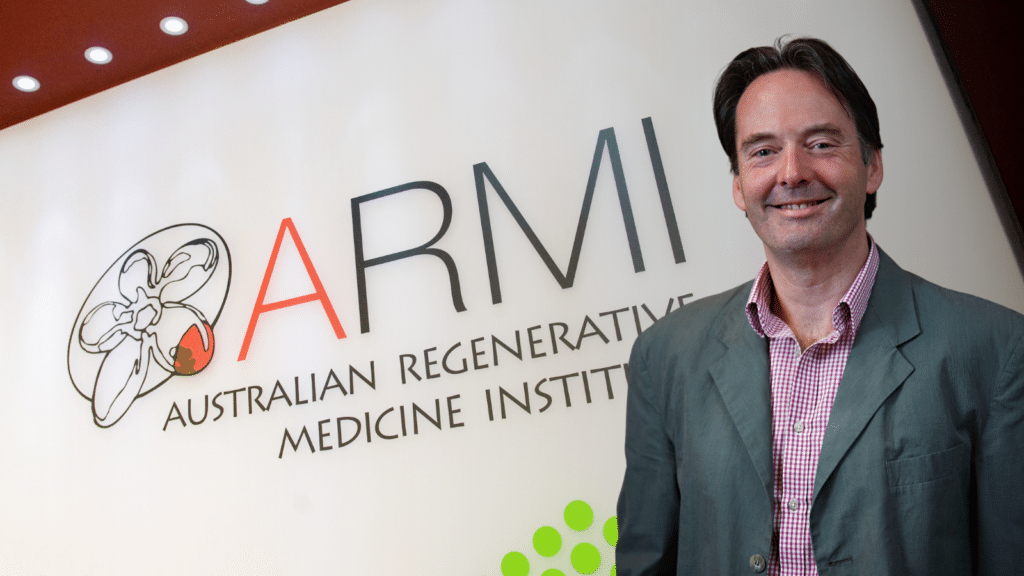End of Year Address from the Director, Professor Peter Currie
Despite another year disrupted by the COVID-19 pandemic, 2021 was a year of tremendous achievement at ARMI. From excellent scientific output to the continued camaraderie amongst ARMI staff and students, ARMI Director of Research Professor Peter Currie reflects on the past year and looks to the future with great optimism.

Q: What were your highlights for ARMI over the past year?
A: Despite the obvious difficulties of running a research organisation and the ever-changing complex environment that every work environment has faced, I’ve been enormously proud and happy to see the productivity. I think one of the opportunities that is often afforded in situations such as this is to focus. We’ve had one of our most impactful years in terms of discovery and publications that we’ve had in our entire history this year.
I just thought that it was a really healthy and positive outcome that people were publishing. We had incredible stories from the 3D Cardiomics from Mirana’s [Ramiliason] group, the iBlastoid story from Jose [Polo], Jan Kaslin had a really lovely story on spinal cord regeneration, James Bourne had some beautiful papers on brain regeneration. At the start of the year, we had our story on macrophages and stem cell niche building. And these are really globally impactful papers, even with a fairly modest team of 20 groups. It’s still not a huge Institute. The beating heart of the Institute, which is its scientific excellence, seems to be chugging along just fine. So that was really the number one highlight of the year.
And the other thing I’d say that, which just happened last week, was the EMBL Australia recruitment, which is such an energising experience. We don’t know what we’ll end up with that recruitment just yet, but it was fabulous to hear four incredible candidates march us through their science. Just knowing that there are people of that calibre out there who are really interested in working at ARMI and know about ARMI and want to be part of it, people from Stanford, from the Max Planck, from Memorial Sloan Kettering. So that was a super positive experience.
Q: Conversely, what have been the challenges of the past year?
A: There’s the obvious; with uncertainty comes fear. Not knowing exactly where we’re going to end up is a draining and mentally difficult process. Some people struggled with the existential threat; we haven’t really had to deal with this sort of level of imposition of who we are and what we do for many years. So we had to be mindful of that, and there was certainly a large amount of mentoring. But I think once people realised that the world wasn’t going to come to an end, and they could get vaccinated and keep working, it became a practical thing. So this year was more about the physical exhaustion of dealing with unusual and difficult practices.
And then the other thing that was really problematic for our workforce is that we are a large international-based workforce. So many people had not been home to see their families, and they were not allowed to leave the country, not knowing when they would be able to see their families. So I think it was a cruel and difficult situation. So I have a lot of sympathy for our international colleagues.
Q: Were there any surprises from this year?
A: I think the big surprise was, for the vast majority of people, how adaptable we are. I don’t know why that would be surprising. Scientists tend to be that way. That’s their job, to move around obstacles to get to the end of it. There were some tricky moments for some people in the first year [of the pandemic], but by the second year, everyone had gotten used to the swing of it. So that surprised me, and also, the productivity was a surprising thing. I would never have expected us to have this volume of high-quality papers out. It just reflects the ability to work through the crisis. You would have thought it would have shut everything down, but it didn’t.
But generally, people’s general ability is just to cope with almost anything. And some of them quite cheerfully, actually. And how we’ve all supported each other. I don’t think I’m surprised by that because we are a little more family than most organisations. So I’m pleased that happened but surprised.
Q: What are your hopes for next year and the future for ARMI in their regenerative medicine space?
A: Regenerative medicine clearly keeps powering through. It’s the decade of delivery for regenerative medicine. So its place in people’s consciousness and its delivery of therapies will be continually on an upward swing.
For ARMI, we have a strategic plan. The EMBL recruitment will help us keep building strength and scale. We have ambitious plans for a new building, and all wheels are in motion. We’re getting some positive signs about how that might happen. The fantastic new Victorian Heart Hospital is emerging. It’s an enormous building, and it’ll change the whole fabric of that side of the campus. I think that will be an exciting project to see come to fruition. It’s a new era for the campus in terms of science.
In terms of science, I think I’ve done about two-thirds of the group leaders’ reviews. Everyone has amazing stories in progress. All of them are doing incredible science. I think next year can be even better than this year in terms of scientific output. So I have no doubt about the quality of science that we’re producing. Everyone will be looking forward to a better year physically than last year. It won’t take much to build a real sense of entity and optimism for 2022. I think we’re already seeing it.
